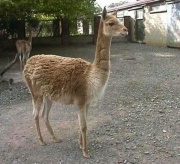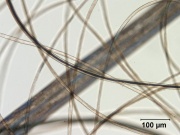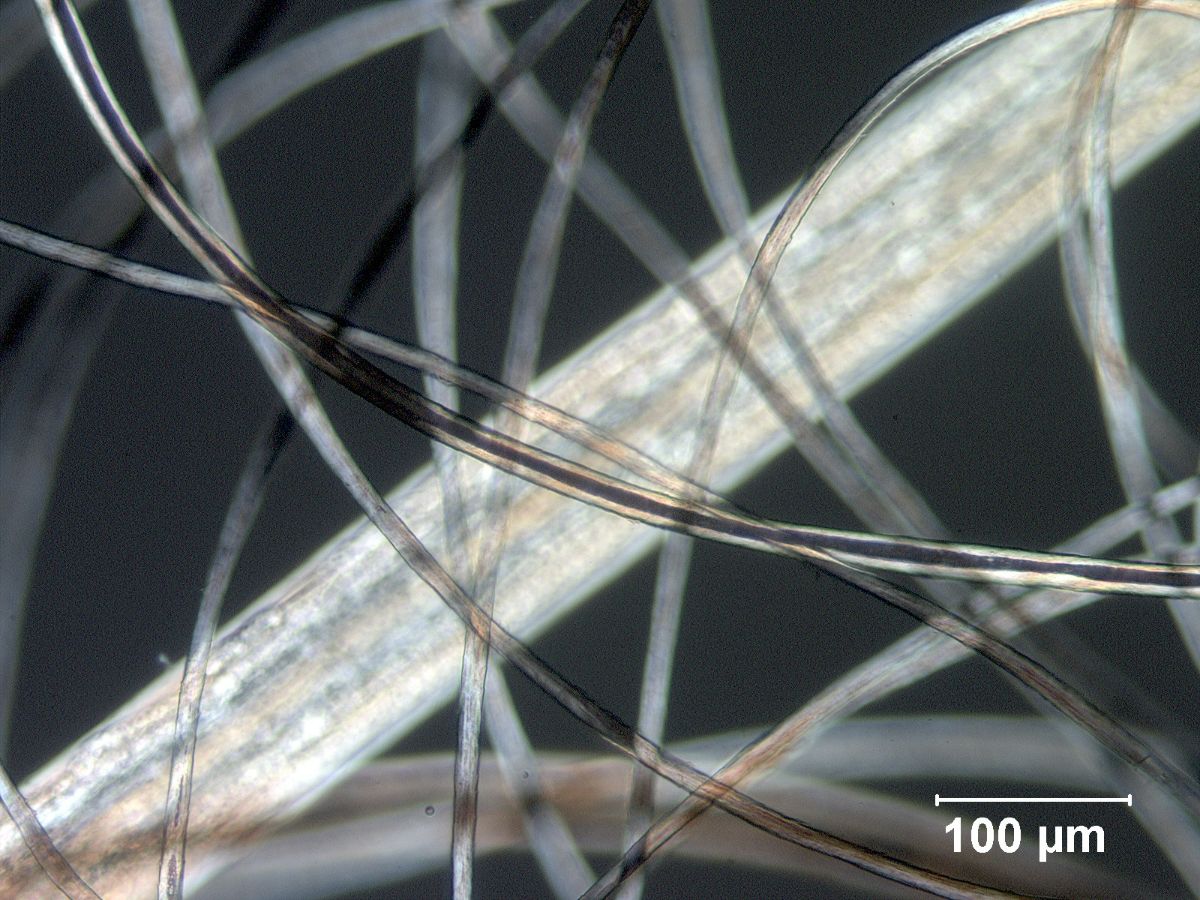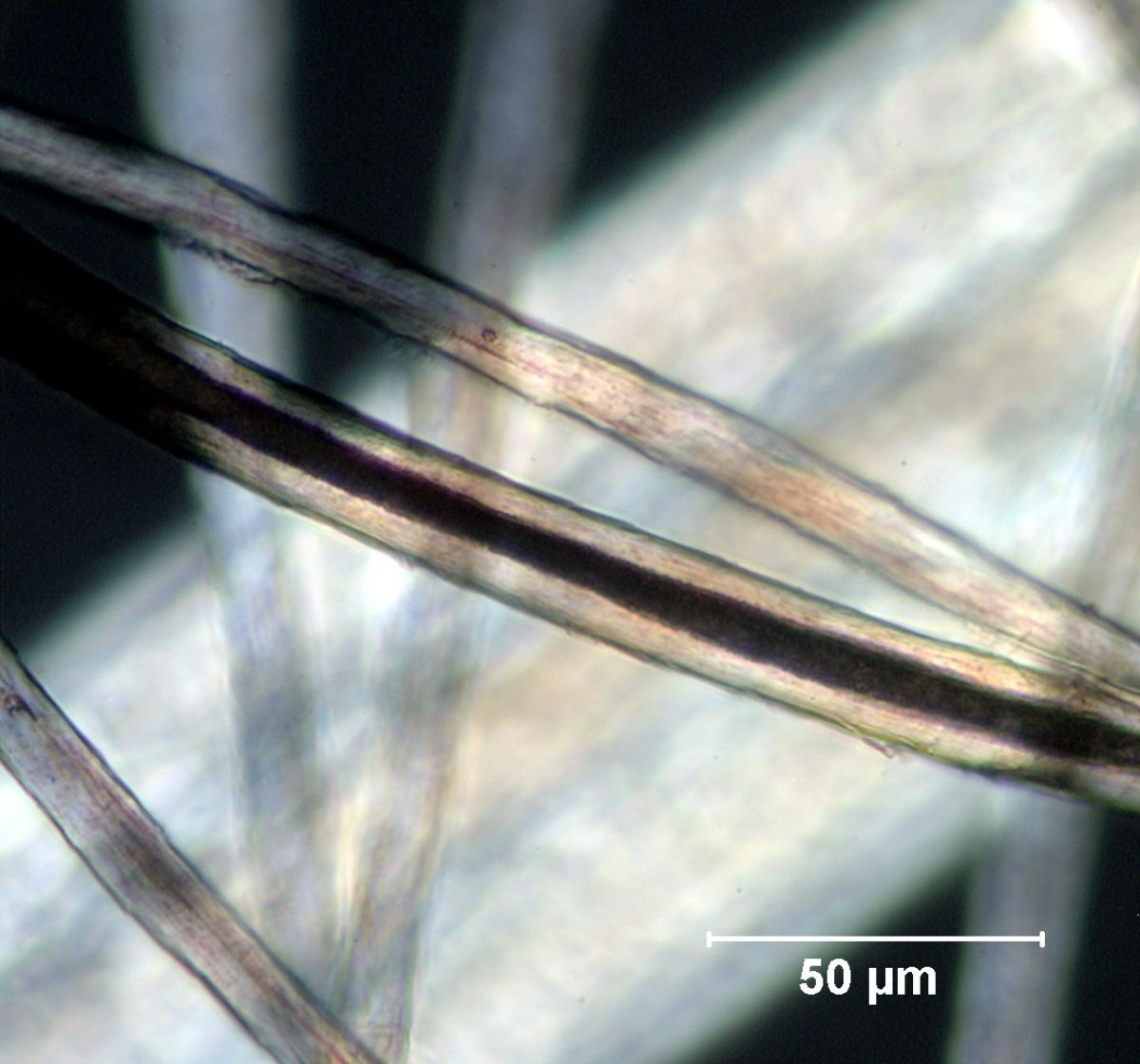Difference between revisions of "Vicuna"
| Line 1: | Line 1: | ||
| − | [[File:vicunawp2.jpg|thumb|Vicuna | + | [[File:vicunawp2.jpg|thumb|Vicuna ''Vicugna vicugna'']] |
| − | |||
| − | ''Vicugna vicugna'']] | ||
== Description == | == Description == | ||
| − | + | [[File:29_Vicuna_200X adj.jpg|thumb|Vicua hair fibers]] | |
The vicuña (''Vicugna vicugna'', formerly ''Lama vicugna'') is a small, wild camelid, closely related to alpacas, llamas, and guanacos. It is found mainly at high altitudes (10,500 to 17,000 feet) in Peru, Bolivia, northern Chile, and Northwestern Argentina. The vicuna produces a fine, downy fleece that is valuable. The straight, silk-like [[wool|wool]] is very rare. It is generally left undyed in its natural white or cream color due to its sensitivity to chemical treatment. Vicuñas have some of the finest fibers in the world, at a diameter of 12 μm. The fiber of cashmere goats is 14 to 19 μm, while angora rabbit is 8 to 12 μm and that of shahtoosh from the Tibetan antelope, or chiru, is from 9 to 12 μm.[9] Since it is sensitive to chemical treatment, the wool is usually left in its natural color. In Peru, individual animals can only be shorn alive, once every three years. Vicuña is used for coats, suits, and soft shawls. | The vicuña (''Vicugna vicugna'', formerly ''Lama vicugna'') is a small, wild camelid, closely related to alpacas, llamas, and guanacos. It is found mainly at high altitudes (10,500 to 17,000 feet) in Peru, Bolivia, northern Chile, and Northwestern Argentina. The vicuna produces a fine, downy fleece that is valuable. The straight, silk-like [[wool|wool]] is very rare. It is generally left undyed in its natural white or cream color due to its sensitivity to chemical treatment. Vicuñas have some of the finest fibers in the world, at a diameter of 12 μm. The fiber of cashmere goats is 14 to 19 μm, while angora rabbit is 8 to 12 μm and that of shahtoosh from the Tibetan antelope, or chiru, is from 9 to 12 μm.[9] Since it is sensitive to chemical treatment, the wool is usually left in its natural color. In Peru, individual animals can only be shorn alive, once every three years. Vicuña is used for coats, suits, and soft shawls. | ||
| Line 10: | Line 8: | ||
vicuna;''Vicugna vicugna''; ''Lama vicugna''; vigogne (Fr.); vicua (Esp.) | vicuna;''Vicugna vicugna''; ''Lama vicugna''; vigogne (Fr.); vicua (Esp.) | ||
| − | [[File: | + | [[File:29_Vicuna_200X_pol adj.jpg|Vicua hair fibers]] |
| − | == | + | [[File:29_Vicuna_500X_pol adj.jpg|Vicua hair fibers]] |
| − | + | == Physical and Chemical Properties == | |
Fiber length = 5 cm (2 inches) | Fiber length = 5 cm (2 inches) | ||
| Line 19: | Line 17: | ||
[[media:download_file_148.pdf|Properties of Natural Fibers]] | [[media:download_file_148.pdf|Properties of Natural Fibers]] | ||
| − | == | + | == Resources and Citations == |
| − | |||
| − | |||
| − | |||
| − | |||
| − | |||
| − | |||
| − | |||
* Marjory L. Joseph, ''Introductory Textile Science'', Holt, Rinehart and Winston, Fort Worth, TX, 1986 | * Marjory L. Joseph, ''Introductory Textile Science'', Holt, Rinehart and Winston, Fort Worth, TX, 1986 | ||
| Line 32: | Line 23: | ||
* J.Gordon Cook, ''Handbook of Textile Fibres:I Natural Fibres'', Merrow Publishing Co. , Durham, England, 1984 | * J.Gordon Cook, ''Handbook of Textile Fibres:I Natural Fibres'', Merrow Publishing Co. , Durham, England, 1984 | ||
| − | * ''Encyclopedia Britannica'', http://www.britannica.com Comment: vicua." | + | * ''Encyclopedia Britannica'', http://www.britannica.com Comment: vicua." accessed 16 Dec. 2004 and June 8, 2019. |
| − | |||
| − | |||
* Edward Reich, Carlton J. Siegler, ''Consumer Goods: How to Know and Use Them'', American Book Company, New York City, 1937 | * Edward Reich, Carlton J. Siegler, ''Consumer Goods: How to Know and Use Them'', American Book Company, New York City, 1937 | ||
Revision as of 09:32, 14 October 2020
Description
The vicuña (Vicugna vicugna, formerly Lama vicugna) is a small, wild camelid, closely related to alpacas, llamas, and guanacos. It is found mainly at high altitudes (10,500 to 17,000 feet) in Peru, Bolivia, northern Chile, and Northwestern Argentina. The vicuna produces a fine, downy fleece that is valuable. The straight, silk-like Wool is very rare. It is generally left undyed in its natural white or cream color due to its sensitivity to chemical treatment. Vicuñas have some of the finest fibers in the world, at a diameter of 12 μm. The fiber of cashmere goats is 14 to 19 μm, while angora rabbit is 8 to 12 μm and that of shahtoosh from the Tibetan antelope, or chiru, is from 9 to 12 μm.[9] Since it is sensitive to chemical treatment, the wool is usually left in its natural color. In Peru, individual animals can only be shorn alive, once every three years. Vicuña is used for coats, suits, and soft shawls.
Synonyms and Related Terms
vicuna;Vicugna vicugna; Lama vicugna; vigogne (Fr.); vicua (Esp.)
Physical and Chemical Properties
Fiber length = 5 cm (2 inches)
Comparisons
Resources and Citations
- Marjory L. Joseph, Introductory Textile Science, Holt, Rinehart and Winston, Fort Worth, TX, 1986
- J.Gordon Cook, Handbook of Textile Fibres:I Natural Fibres, Merrow Publishing Co. , Durham, England, 1984
- Encyclopedia Britannica, http://www.britannica.com Comment: vicua." accessed 16 Dec. 2004 and June 8, 2019.
- Edward Reich, Carlton J. Siegler, Consumer Goods: How to Know and Use Them, American Book Company, New York City, 1937
- Rosalie Rosso King, Textile Identification, Conservation, and Preservation, Noyes Publications, Park Ridge, NJ, 1985
- Random House, Webster's Encyclopedic Unabridged Dictionary of the English Language, Grammercy Book, New York, 1997
- The American Heritage Dictionary or Encarta, via Microsoft Bookshelf 98, Microsoft Corp., 1998
- Animal Fiber, https://en.wikipedia.org/wiki/Animal_fiber", accessed June 8, 2019



